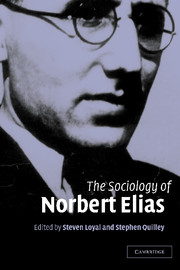Book contents
- Frontmatter
- Contents
- List of contributors
- Acknowledgements
- 1 Towards a ‘central theory’: the scope and relevance of the sociology of Norbert Elias
- Part I Sociology as a human science: Norbert Elias and the sociology of knowledge
- Part II Processes of stratification: figurations of race, class and gender
- Part III The formation of individuals and states
- Part IV Religion and civilizing processes: Weber and Elias compared
- Index
- References
1 - Towards a ‘central theory’: the scope and relevance of the sociology of Norbert Elias
Published online by Cambridge University Press: 22 September 2009
- Frontmatter
- Contents
- List of contributors
- Acknowledgements
- 1 Towards a ‘central theory’: the scope and relevance of the sociology of Norbert Elias
- Part I Sociology as a human science: Norbert Elias and the sociology of knowledge
- Part II Processes of stratification: figurations of race, class and gender
- Part III The formation of individuals and states
- Part IV Religion and civilizing processes: Weber and Elias compared
- Index
- References
Summary
Introduction
There were periods during the twentieth century when sociology was imbued with a certain social and intellectual prestige. Sometimes this was for the wrong reasons, as during the late 1960s when students entering the proliferating sociology departments conflated the scientific investigation of social processes with the politics of emancipation. A decade earlier, practitioners of the newly professionalized discipline of ‘systematic sociology’ (Johnson 1960) confidently proclaimed the emergence of a ‘mature science’ (Parsons quoted in Goudsblom 1977: 23). But the accomplishments of this emerging and overly self-confident discipline were invariably disappointing. And despite the claims for a cumulative and iterative relationship between theory and empirical observation, the links remained tenuous between the theoretical edifice associated with the towering figure of Talcott Parsons and the data-gathering of mainstream sociology. Since the 1970s, the illusion of any kind of paradigmatic consensus has been shattered. Sociology remains ‘a multi-paradigmatic or multi-perspectival subject … conflict ridden … [and without any] overall consensus … regarding concepts, theories and methods’ (Dunning and Mennell 2003: 1). And this situation has been made considerably worse by the abandonment, by possibly a majority of sociologists, of the very idea that the investigation of social processes can be scientific, and by implication of the idea that it should be possible to build up, over time, a stock of reality-congruent ideas about the operation of social processes.
- Type
- Chapter
- Information
- The Sociology of Norbert Elias , pp. 1 - 22Publisher: Cambridge University PressPrint publication year: 2004
References
- 11
- Cited by



